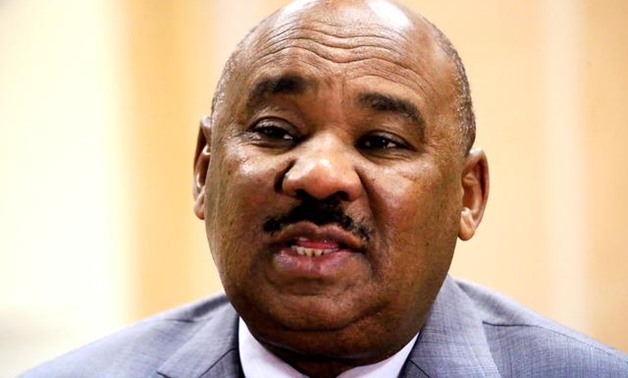
FILE PHOTO: Sudan's Finance Minister Ibrahim Elbadawi speaks during an interview with Reuters in Khartoum, Sudan November 7, 2019. REUTERS/Mohamed Nureldin Abdallah/File Photo
KHARTOUM (Reuters) - Sudan’s transitional government is to postpone lifting fuel subsidies, initially planned as part of the 2020 budget, the information minister said on Saturday.
Finance minister Ibrahim Elbadawi had said on Friday the fuel subsidies will be gradually removed.
But the government met on Saturday with the former opposition which helped bring down veteran ruler Omar al-Bashir in April and agreed to not implement the decision until a conference in March where economic reforms will be discussed, information minister Faisal Saleh told Reuters.
“In light of the decisions of this conference will be determined the economic policies of the country, including policies regarding commodity subsidies,” Saleh said.
The removal of fuel subsidies is sensitive as it would hit a population suffering for years from economic crisis and high inflation.
Sudan’s transitional authorities face the tough task of turning around an economy wrecked by three decades of mismanagement under the rule of Bashir, who the military ousted in April after months of street protests.
Complicating Sudan’s recovery is its inclusion on the United States’ list of state sponsors of terrorism. That designation has so far blocked Sudan from tapping the International Monetary Fund and World Bank for support.
Sudan’s transitional cabinet of technocrats was formed by Prime Minister Abdalla Hamdok in September after a power-sharing deal was reached between the Transitional Military Council that took over after Bashir’s overthrow and the Forces of Freedom and Change (FFC), a coalition of former opposition and protest groups.
Finance Minister Ibrahim Elbadawi said on Friday the transitional government plans to remove fuel subsidies gradually in 2020. He also said public sector salaries would be doubled to ease the impact of galloping inflation.
The decision to suspend the lifting of subsidies was made after Hamdok, Elbadawi and other ministers met with FFC representatives, Saleh told Reuters on Saturday.
Elbadawi, a former World Bank economist, told Reuters in November that public salaries would need to be increased and a social support network established to prepare for the painful removal of fuel and food subsidies. He said Sudan would need up to $5 billion in budget support to avert economic collapse and launch reforms.
Hamdok, an economist, told Reuters in November cash transfers were one scenario discussed to offset a cut in food and other subsidies.

Comments
Leave a Comment